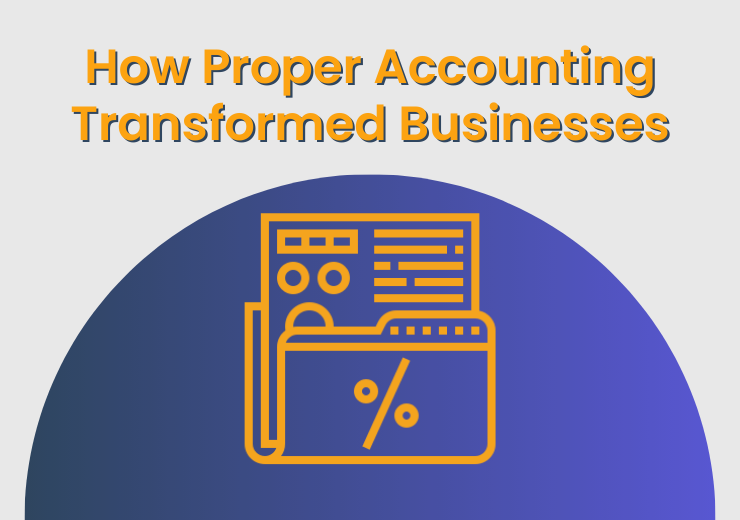1. Introduction
Accounting is often seen as a necessary evil, a boring task that only serves to keep the taxman at bay. However, in reality, accounting is much more than that. It’s the art and science of tracking, analyzing, and managing financial data. It’s about understanding where every dollar comes from and where it goes. But how does proper accounting transform businesses? Let’s explore the journey together.
2. The Basics of Accounting
Understanding the Balance Sheet
The balance sheet, often referred to as the financial snapshot of a company, provides a clear picture of its financial health. It lists assets, liabilities, and owner’s equity. By maintaining an updated balance sheet, businesses can gauge their net worth and financial stability.
Decoding the Income Statement
The income statement, also known as the profit and loss statement, reveals a company’s revenues, costs, and profitability over a specific period. It’s the compass that guides businesses toward profit by highlighting areas that need attention and those that are performing well.
The Importance of Cash Flow
Cash flow, the lifeblood of any business, represents the inflow and outflow of money. It ensures that a business can meet its financial obligations and seize opportunities when they arise. By managing cash flow effectively, businesses can avoid financial crises and invest in growth.
3. Proper Accounting Saves Money
Cost Control and Reduction
Proper accounting helps identify areas where costs can be controlled or reduced. By analyzing expenses and their impact on profitability, businesses can make informed decisions to trim excess fat, ultimately saving money.
Identifying Profitable Ventures
Accounting doesn’t just tell you where you’re losing money; it also shows you where you can make more. By tracking the performance of different products or services, businesses can focus on those that yield the highest returns.
4. Strategic Decision-Making
Budgeting and Forecasting
With proper accounting, businesses can create budgets and forecasts that serve as roadmaps for financial success. These plans allow for proactive decision-making, ensuring that resources are allocated efficiently.
Investment and Expansion Planning
When a business wants to grow or invest in a new project, accounting plays a pivotal role. It provides insights into the financial feasibility of such ventures and helps in securing the necessary funding.
5. Financial Health Assessment
Detecting Early Warning Signs
Accounting isn’t just about tracking profits; it’s also about identifying potential financial troubles. Early detection of issues allows for corrective actions, preventing small problems from snowballing into major crises.
Attracting Investors and Lenders
Investors and lenders require clear financial data before committing to a business. Proper accounting builds trust and credibility, making it easier to attract capital when needed.
6. Legal Compliance and Tax Benefits
Staying on the Right Side of the Law
Proper accounting ensures that a business complies with all financial regulations and reporting requirements. This not only prevents legal troubles but also maintains a good reputation.
Maximizing Tax Efficiency
Accounting can legally minimize tax obligations. By understanding the tax code and using it to their advantage, businesses can keep more of their hard-earned money.
7. Streamlining Operations
Efficiency through Financial Automation
Modern accounting tools and software can streamline financial operations, reducing the time and effort required for accounting tasks. This efficiency translates to cost savings and more time for strategic planning.
Employee Morale and Retention
Accurate and timely payrolls, benefits, and financial stability enhance employee satisfaction and retention. A well-managed business is more likely to attract and retain top talent.
8. Case Studies: Success Stories
Let’s take a look at some real-life success stories where proper accounting has transformed businesses. These case studies will illustrate how accounting can turn a struggling enterprise into a thriving one.
9. The Human Factor in Accounting
Behind every successful accounting system, there are dedicated professionals. We’ll explore the importance of the human element in accounting and how skilled accountants contribute to a business’s success.
10. Conclusion
In conclusion, proper accounting is the unsung hero of business success. It not only ensures financial stability but also acts as a guiding light, helping businesses navigate through challenges and seize opportunities. By embracing the power of accounting, businesses can transform themselves from struggling entities into thriving success stories.
Frequently Asked Questions
1. What is the role of accounting in business transformation?
Accounting plays a crucial role in business transformation by providing insights into financial health, cost control, profitable ventures, and strategic decision-making. It acts as a compass for businesses, guiding them toward profitability and growth.
2. How does accounting help in cost reduction?
Accounting helps in cost reduction by identifying areas where expenses can be controlled or trimmed. It provides a clear view of where a business is overspending, allowing for informed decisions to save money.
3. Why is financial automation important in accounting?
Financial automation is essential in accounting because it streamlines operations, reduces the time and effort required for tasks, and minimizes the risk of errors. It enhances efficiency and allows businesses to focus on strategic planning.
4. Can proper accounting attract investors and lenders?
Yes, proper accounting can attract investors and lenders. It builds trust and credibility by providing clear financial data, making it easier for businesses to secure the capital they need for growth and expansion.
5. How can businesses use accounting to maximize tax efficiency?
Businesses can maximize tax efficiency by understanding the tax code and using it to their advantage. By legally minimizing tax obligations, they can keep more of their earnings and reinvest in their growth.

